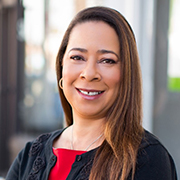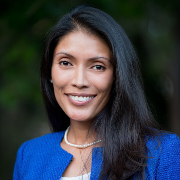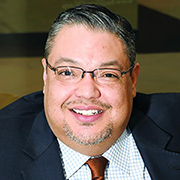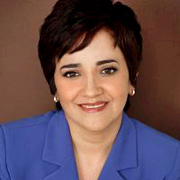2019 Latino Leadership Conference Sessions
1st Concurrent Session 10:00 a.m. - 11:00 a.m.
Panel - Latinx Veterans: Serving Those Who Served | Thousand Cranes Room
For Latino veterans, the return to civilian life can prove to be more difficult when the services available do not tend to be culturally sensitive or appropriate to latinx cultural norms. Families require language issues to be addressed and second- and third-generational competency to support our veterans. With these obstacles at home, it is important for employers to understand these barriers as well as create a more inclusive workplace. This panel will consist of representatives from different organizations who hire, recruit, manage and/or support employees who have a military background that are transitioning into a civilian life and/or may still be on active duty, as well as Veterans and active duty members who have transitioned into the workplace or currently transitioning into a workplace.
Moderator
Panelist

Enrique Baltierra
HR & Talent Executive
iPotential HR Solutions

Lisa Carrington Firmin, MS, MHRM, Colonel, USAF, Retired
Associate Provost for Veteran and Military Affairs
The University of Texas at San Antonio

Jose Gabriel Espinoza CPSM, CPSD, MBA
Supplier Diversity Program Manager
California Water Service

Pat Mendez
Strategy and Capture Manager, Public Sector Business Development
PARC, A Xerox Company
Panel - Latinas in Leadership: Representation Matters | California Room
Today’s Latina women in business identify one factor that unifies us all, the desire to succeed in corporate America. No matter how you define success, Latina women are ambitious, hard-working, collaborative and energetic in moving through the career ladder. With the pressures of society to conform to traditional White male leadership style, Latinas’ are impacted by the ability to lead with authenticity. In order for Latinas to practice leading with authenticity, we must create an environment in which we embrace and use Latinas’ strengths and experiences.
Moderator
Panelist

Susan Baida
Director
UPMC Center for Engagement and Inclusion

Ana Hooker
Senior VP, Operations
Exact Sciences

Elizabeth Laine
Vice President of Client Services
Lead Inclusively, Inc

Priscilla Chavez
Manager, Diversity and Inclusion
PCL Construction

Angelita Cardenas
Healthcare Services Account Manager
GE Healthcare
2nd Concurrent Session 11:15 a.m. - 12:15 p.m.
Panel - Workforce of the Future: Why DACA is important | Thousand Cranes Room
Dreamers are the driving force of the future generation of Latino Leaders. It is important to support Dreamers in their professional endeavors within organizations and corporations. The DACA program has empowered nearly 800,000 dreamers to pursue their educational and professional goals. They are known to be some of the brightest and hard-working Latinos in the United States today. Dreamers have a growing economic power, as entrepreneurs eight percent of dreamers over the age of twenty-five have started their own businesses. Many of them are studying to be future doctors, lawyers, business leaders, engineers and scientists. Supporting them in corporations will continue to empower this young generation to continue pursuing their dreams and contribute to the Latino force of the future.
Moderator
Panelist
Panel- Latinx LGBTQ+: Living Authentically | California Room
The movement for LGBTQ+ equality and justice has advanced largely because of organized community support and advocacy; as a result, the country and world are more aware of the plight for equality and discussions surrounding its importance are carried openly in public forums. This has paved the way for historic milestones such as marriage equality, workplace protections, and familial recognitions in multiple sectors across private and public spectrums. Ethnicity, gender,sexuality, ability, class, education, experience all help to mold our unique perspectives. Queer & Trans People of Color (QTPOC) have traditionally been left out of mainstream activist movements. If we want to lift up these marginalized groups, it is absolutely crucial that we understand the unique challenges faced by QTPOC and intentionally address what pitfalls led to their exclusion in the first place.
Moderator
Panelist
3rd Concurrent Session 1:45 p.m. - 2:45 p.m.
Panel - Latino ERGs in the Workplace: Demonstrating Value and Creating Connections | Thousand Cranes Room
A key component of every effective Diversity and Inclusion strategies include creating and developing Employee Resources Groups (ERGs) to serve as an integral role in supporting associates and aligning to the business mission. Latino/Hispanic ERGs primary mission is to strengthen the connection between the company and employees, helping to empower, develop and retain Hispanic talent and bring added value to the company. Additionally, ERGs' Strategic positions are to work together to increase the Return on Investment (ROI) by aligning and supporting the Company’s Strategic Goals and Objectives through community involvement and developing meaningful relationships.
Moderator
Panelist

Alexander Flores
Sr. Supply Chain Analyst
Daimler

Enna Jimenez
Head of QA, Senior Director Quality Assurance, Civil and Identity Division
IDEMIA

Laura Ramirez
Director Diversity & Inclusion - Human Resources
Ericsson

Stephen Torres
Strategic Planning Senior Advisor- Strategy, Integrated Planning and Performance
Southern California Edison
Panel - Colorism: Why Skin-Color Privilege...and Prejudice Matter in the Workplace | California Room
Dialogue about colorism in Latinx communities has historically been non-existent, while the effects of skin-color privilege and prejudice deeply impacts the lives Latinx communities in a number of ways. In particular, research indicates that darker skin-color prejudice negatively affects Latinx communities’ mental health, education, and income. Research examining the impact of skin-color and phenotype on the life chances of Mexican Americans found that compared with their lighter skinned and European looking counterparts, darker and more indigenous looking Mexican Americans reported less educational attainment, lower income, and higher discrimination. Skin-color privilege permeates every facet of the Latinx experience, including in the acquisition of higher paying jobs, promotions, and income levels. The need to acknowledge and address our within group differences remains as paramount today as it ever has.
Moderator
Panelist
4th Concurrent Session 3:00 p.m. - 4:00 p.m.
Panel - Inclusive Leadership: A 21st Century Strategy to Foster Engagement and Innovation
Panel - Bridging the Gap: Multi-generational Workforce | California Room
According to the Pew Research Center, there is a generational cultural gap among Hispanic and Latinx Americans. As direct ties to cultural heritage and social traditions fade, so does the likelihood that newer generations will even identify as Latino or Hispanic. While these ties are shrinking, members of the new generation are also proving to be the burgeoning mavericks in fields such as technology, medicine, and politics, bringing new perspectives and a generational identity of diversity and tolerance to the table. With multiple generations currently in the workforce, one of the most challenging aspects is getting each group to respect the unique talents of the other. Each generation comes to the workplace with a distinct set of values, attitudes and behaviors. In addition, each has their own expectations, priorities, approaches, work and communication styles. These differences between each generation calls for improved hiring practices, managing styles, rewards, training and retention of their employees.
Moderator
Panelist





















